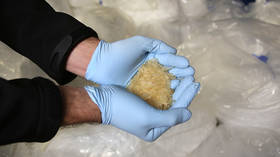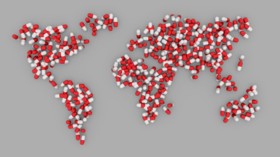German opposition demands free meth

Calling for a “fundamental rethink” of the country’s drug policy, Germany’s Left Party (Die Linke) hopes to make small amounts of crystal meth available to addicts under close “therapeutic support,” it announced in a motion on Monday.
The party is also seeking to decriminalize the possession of small amounts of meth and other hard drugs, including cocaine, heroin, and ecstasy, in the hope that reducing the time spent prosecuting addicts will free up police resources for more important matters.
Drug users must be “consistently protected from criminal prosecution,” the parliamentary motion states. “Police, public prosecutors, courts and last but not least medical facilities must be relieved and be able to concentrate on important public welfare tasks.”
Crystal meth use in Germany has been on the rise for years, with the number of related crimes up by 18.9% in 2020 over the previous year, for a total of 12,000 cases. While newer statistics are not yet available, drug policy experts have warned that the Covid-19 lockdowns likely exacerbated the problem, as they have in other countries.
Nor has the Left Party always been in favor of letting meth addicts use with impunity. Drug policy spokesman Frank Tempel explained as recently as 2015 that while he was in favor of legalizing substitutes for meth, which would give addicts “controlled quality” to rely upon, the substance itself must remain banned. “This stuff is so dangerous you can’t legalize it,” he said.
Germany began allowing the use of cannabis for medical purposes in 2017, and earlier this year began the process of legalizing the drug recreationally. The substance will remain off-limits for children and young people, but would-be German cannabis entrepreneurs are concerned that excessive red tape and over-taxing might doom the experiment to failure, driving consumers back to the illicit suppliers legalization is meant to defang.
No European country has yet completely legalized recreational cannabis, though the Netherlands famously sells marijuana in ‘coffee shops’, and Spain and Portugal have decriminalized the drug. Portugal has also allowed cannabis for medical use since 2018.
Regarding harder drugs, the German Left may be taking its cue from Portugal, which decriminalized possession of all narcotics in 2000. While selling drugs remains illegal, the amount of drug-related violence has declined significantly in the country, and addicts are encouraged to seek help rather than be imprisoned. Two decades after passing the controversial measure, Portugal boasts a rate of drug-related deaths five times lower than the EU average, half as many heroin addicts as it had in 1999, and an HIV transmission rate that has dropped by a factor of 18.
A 2019 study of 70 European cities’ wastewater revealed Germany to be the meth capital of Europe. The top three heaviest-using cities – Erfurt, Chemnitz, and Dresden – were all found in Germany, followed by Bratislava in Slovakia and Brno in the Czech Republic. Meanwhile, the German city of Saarbrucken was found to have the highest rates of use of amphetamine, a closely-related stimulant.













